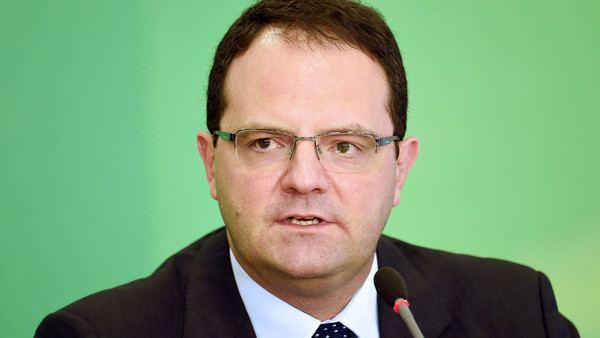Brazil’s central bank is helping Brazilian companies to cope with market volatility by offering programmes to hedge currency risk, according to the country’s new finance minister, who ruled out introducing capital controls to fight the recent collapse in the real.
“The central bank has offered a substantial amount of swaps operations to Brazilian firms so that they can withstand this change in the exchange rate. This gives some hedging options for them,” Nelson Barbosa told the Financial Times in Davos. “There are not so many capital outflows from Brazil right now. You have a lot of exchange rate volatility without asset flows but we see a very sharp realignment of prices because of what is happening in the synthetic [derivatives] markets.”
The comments come as Mr Barbosa and the rest of the Brazilian government are frantically fighting to halt a collapse of market confidence in Brazilian policies and assets. On Thursday the Brazilian real fell to a record low against the dollar after tumbling by 32 per cent last year and more than 5 per cent since the start of 2016. Long-term interest rate futures also jumped sharply on Thursday, after the central bank defied expectations that it would raise rates — and decided to keep them steady at 14.25 per cent.
Mr Barbosa has espoused relatively orthodox economic policies since taking office in December but there have been concerns that he might revisit the unpopular statist policies of Ms Rousseff’s first four-year term. Brazilian newspaper Folha de S.Pauloreported earlier this month that the government was planning to extend credit via public banks and funds to small and medium-sized companies in sectors such as civil engineering and infrastructure.
“Barbosa’s more lax stance on quasi-fiscal policy sends mixed signals,” said João Augusto de Castro Neves of Eurasia Group, adding that economic policy under Mr Barbosa would also likely be dictated by political turmoil in Congress.
The crisis around Brazil partly reflects a wider loss of confidence in emerging market assets around the world, as global investors re-evaluate their portfolios following the US Federal Reserve’s decision to raise interest rates. However, the problems in Brazil have been exacerbated by a series of political crises around the government of Dilma Rousseff, and a perception that the commodities-dependent economy has been particularly badly hit by the recent sharp falls in the price of oil and other raw materials.
There are also mounting fears that Brazilian companies will struggle to repay their external corporate debts as the real tumbles. And this pernicious cocktail of problems prompted the International Monetary Fund to downgrade Brazil’s outlook very sharply when it issued its latest update to its world economic outlook this week. It now expects the economy to contract by 3.5 per cent this year, compared to an earlier forecast of 2.5 per cent contraction, and a decline in growth of 3.8 per cent last year.
Speaking on the sidelines of the Davos meeting, Mr Barbosa — who has historically been perceived as a political leftist — admitted that this grim economic picture was unlikely to change soon, given that oil prices are still well below the $45 dollar per barrel level that state-controlled oil company Petrobras had assumed to see this year. However, he insisted that the government was now committed to implementing a radical programme of fiscal reform, coupled with long-delayed infrastructure reforms that are intended to make the economy more competitive.
He argued that the sheer scale of the current crisis should galvanise political support around these long-delayed reforms.
“I think the beginning of this year is a turning point because we are seeing the collapse in commodity prices which is hitting us hard, but that is eliminating part of the political noise [against reform] — we expect that in the second half of the year we will have a reduction in inflation and stabilisation of the economic situation.”
He also argued that Petrobras was seeking to put itself on a more secure footing by selling assets. “Petrobras is doing a complete re-evaluation of its strategy — it wants to sell $14.4bn in non-strategic assets and build cash to ensure it can go through this year and early next year without going to the world markets.”
